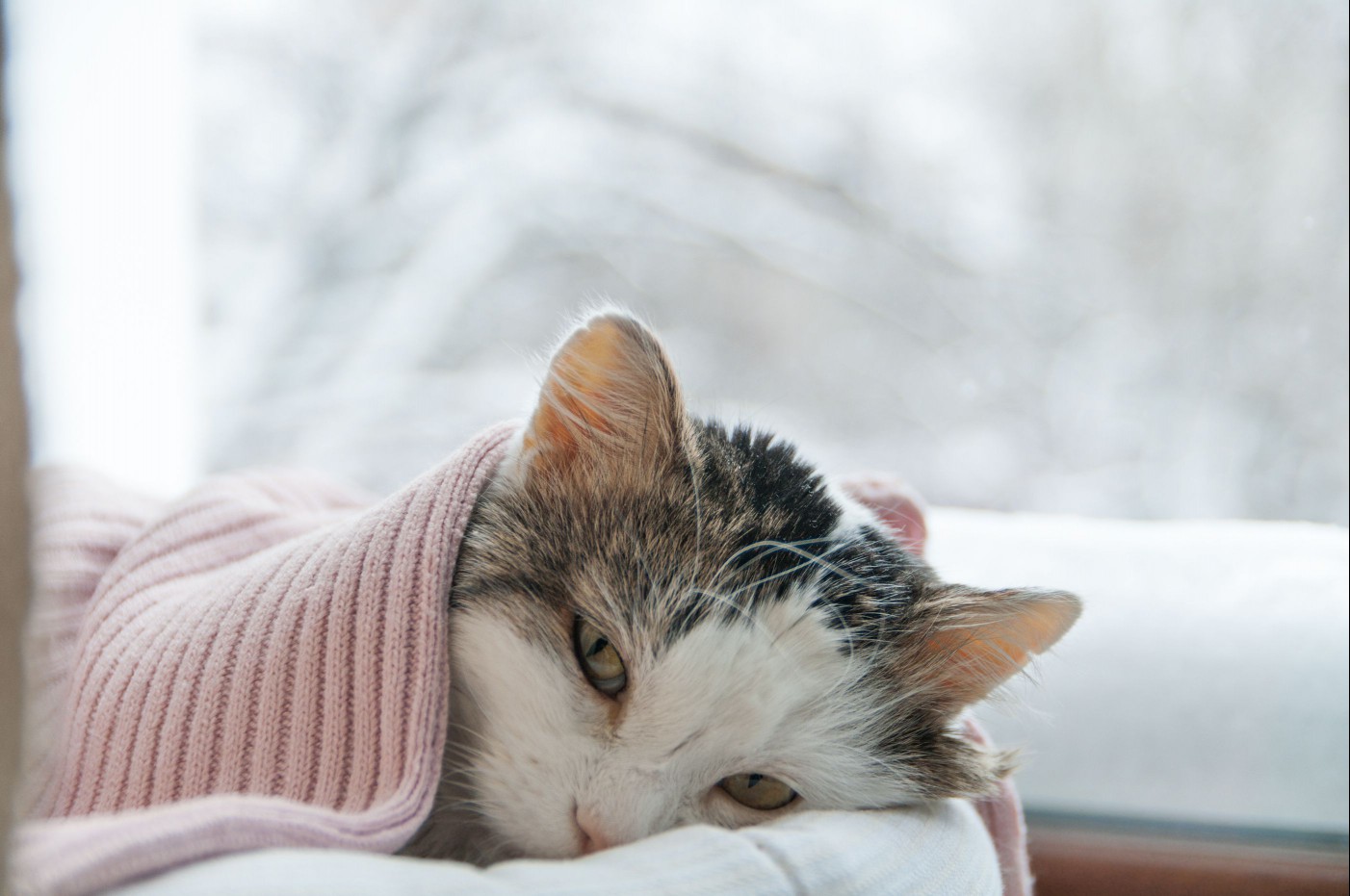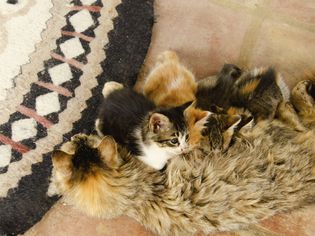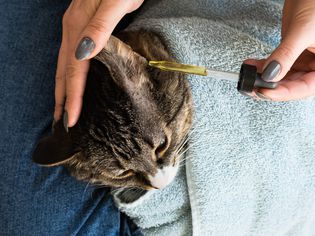If you have a cold, you may wonder if your cat can get this illness too. While cats can be infected with viruses that cause symptoms that may look similar to human colds, they are unlikely to catch your cold virus. However, several common upper respiratory infections occur in cats and may require veterinary care. Here's what to do if you think your cat has a cold or other respiratory illness.
Can Your Cat Catch Your Cold?
No, cats can't catch the common cold from humans, but they can contract other respiratory diseases. Your cat cannot catch a cold virus from you because most cold-causing viruses in people are specific to humans.
When people "catch" colds, they become infected with viruses that cause symptoms of upper respiratory illness. These may include a sore throat, cough, runny nose and congestion, headache, and body aches. Viruses that commonly cause colds in people include respiratory syncytial virus, human parainfluenza viruses, some human coronaviruses, adenovirus, and human metapneumovirus.
Cold viruses are spread by person-to-person contact, and there is no cure. Treatment involves supportive care, like getting plenty of rest and staying hydrated, while the immune system fights off the infection. Most people recover from colds in about 7-10 days. Colds may pose a greater risk to people with compromised immune systems or who suffer from respiratory conditions like asthma.
Even though your cat won't catch your cold virus, there are other illnesses they can get from people or other animals. If you are sick, it's always a good idea to wash your hands thoroughly before and after handling your cat.
Warning
There are some respiratory viruses that you can spread to your cat. Influenza A viruses can spread from people to cats, and cats have become infected with SARS-CoV-2 (the virus that causes COVID-19) from contact with infected people.
If you are sick with either of these illnesses, it is best to isolate yourself from your cat and have someone who is not infected care for them until you are better. In most cases, illnesses have been mild in domestic cats who have become infected with the flu or COVID-19.
How Do Cats Catch Colds?
Colds in cats are called upper respiratory infections, sometimes abbreviated as URIs, because of the area of the respiratory tract they commonly affect. URIs can be caused by viruses, bacteria, and fungi. These are easily spread between cats, especially in crowded, stressful conditions like animal shelters. Even indoor cats can catch colds if they get exposed to a pathogen from contaminated items, people, or other animals.
The most common viruses are feline herpesvirus 1 (not the same as human herpesviruses) and feline calicivirus, which cause around 90% of upper respiratory infections in cats. Cats with feline herpesvirus are often infected as kittens, and once infected, they have the virus for life. When they are otherwise healthy and not overly stressed, the immune system controls the virus and prevents symptoms from occurring. At times of stress or if the immune system becomes compromised, they may have repeat instances of illness. Cats with feline herpesvirus can live normal, happy lives, although it can be fatal in kittens. Your veterinarian can talk with you about long-term support for a cat with feline herpesvirus.
Bacterial infections are often caused by Bordetella bronchiseptica, various Mycoplasma species, and Chlamydia felis, and they account for many of the remaining URIs in cats.
Fungal infections are caused by Cryptococcus neoformans or C. gattii and Aspergillus. Fungal infections in cats can be quite serious, sometimes life-threatening, and often are not restricted to the upper respiratory tract. Fortunately, fungal infections are an uncommon cause of upper respiratory symptoms in cats.
What Are the Symptoms of Colds in Cats?
Symptoms of upper respiratory infections in cats often include:
- Sneezing
- Nasal discharge, either clear, yellow, or green
- Runny eyes, inflammation in eyelids and the tissues around the eyeball (conjunctivitis)
- Coughing
- Sores in the mouth or on the nose
- Congestion
- Snoring
- Loss of appetite
- Fever
- Voice changes, like becoming hoarse when meowing
Contact your veterinarian for advice if you notice the above signs. However, take your cat to a vet as soon as possible if you observe:
- Open-mouthed breathing, rapid breathing, or any breathing difficulties
- Your cat has stopped eating or drinking for more than one day
- Lethargy, listlessness, or behavior changes
- Fever over 103 degrees F (if you can take your cat's temperature at home)

Tanchic/iStock/Getty Images Plus
How Are Colds Treated in Cats?
Treatment for your cat's cold will depend on the severity and underlying cause.
Bacterial and fungal infections require medications to clear the infection. Sometimes long courses of medications are needed, particularly for fungal infections.
Viral infections do not need to be treated with medications unless they become severe or develop secondary bacterial infections. Most cats recover from upper respiratory viral infections in about 7-10 days.
Cats with severe upper respiratory infections may need to be hospitalized for treatment and supportive care.
Home Treatment
If your veterinarian diagnoses a viral URI that is mild to moderate, you can often give supportive care to your cat at home until recovery.
- Make sure your cat is eating well and drinking plenty of water.
- Offer strong-smelling canned food if your cat is reluctant to eat. URIs affect a cat's ability to smell their food, so the smellier the better.
- Keep your cat isolated from other cats in the household.
- Keep your cat in a stress-free and quiet environment.
- If your cat is congested, use a humidifier or put your cat in a bathroom with the shower running until the room is steamy to help break up congestion (do not put your cat in the shower or get them wet).
If your cat does not show improvement after a few days, it's time to go back to the vet. Your cat may need to be hospitalized or given additional care to clear the infection.
Related Article

Why You Should Not Scruff a Cat to Discourage Bad Behavior
Scruffing is a general term for a variety of holds on the skin of a cat’s neck. Cats are only gra

Why Your Cat Is Meowing So Muchâand Other Ways They Seek Your Attention
Cats meowing so much can often be misconstrued as a "behavior problem" when it's often completely n

What to Do When Your Cat Dies at Home
When facing the imminent death of a terminally ill beloved cat, or when a feline companion has sudd

Introducing a Kitten to an Older Cat
Friendly, single adult cats can have trouble adjusting to living with a new kitten. Often, the olde

How Soon Can a Cat Get Pregnant After Having Kittens?
Female cats can become pregnant again soon after having a litter of kittens. It can take only weeks

How to Clean Cat Ears in 8 Steps
Depending on your cat’s grooming habits and environment, you may or may not need to clean its ear

Siamese Cat: Breed Profile, Characteristics & Care
The Siamese is a medium-sized, svelte, and refined-looking cat with long, tapering lines and striki

Devon Rex: Cat Breed Profile, Characteristics & Care
The Devon rex is known for their alien-like appearance, marked by large, low-set ears, bi
About FleaFree Feline
We are a premier digital platform committed to delivering high-quality content to our readers. Our mission is to provide accurate, reliable, and engaging information that adds value to our audience's daily lives.
Our team consists of experienced content creators and subject matter experts who uphold the highest standards of professionalism. In an era of information overload, we curate content with care, ensuring our users receive only the most relevant and trustworthy information.
Beyond just reporting facts, we focus on depth and context. Through expert analysis, comprehensive research, and clear presentation, we help our audience gain meaningful insights and make informed decisions.
We take pride in being a trusted information source for our growing community of readers. Our user-first approach means we continuously adapt to provide content that meets our audience's evolving needs and interests.
Innovation and excellence drive everything we do. We're committed to improving our platform and services to deliver the best possible experience for our users.


Comments on " Can My Cat Catch My Cold?" :